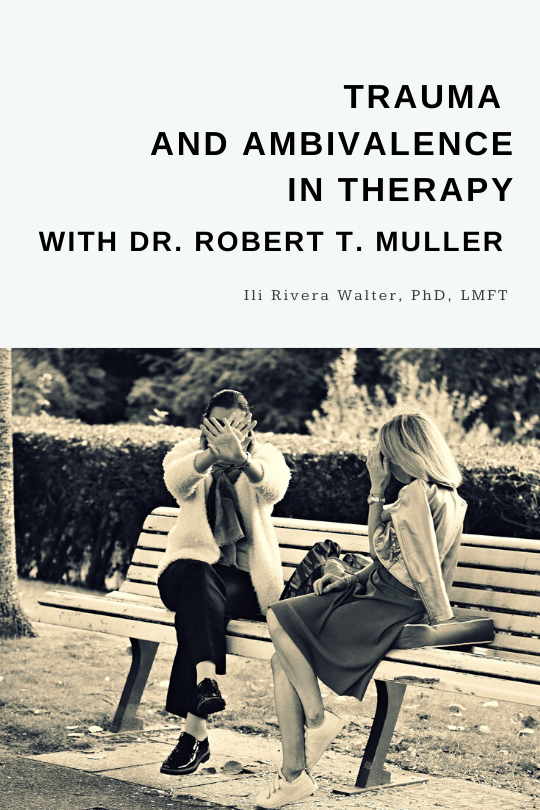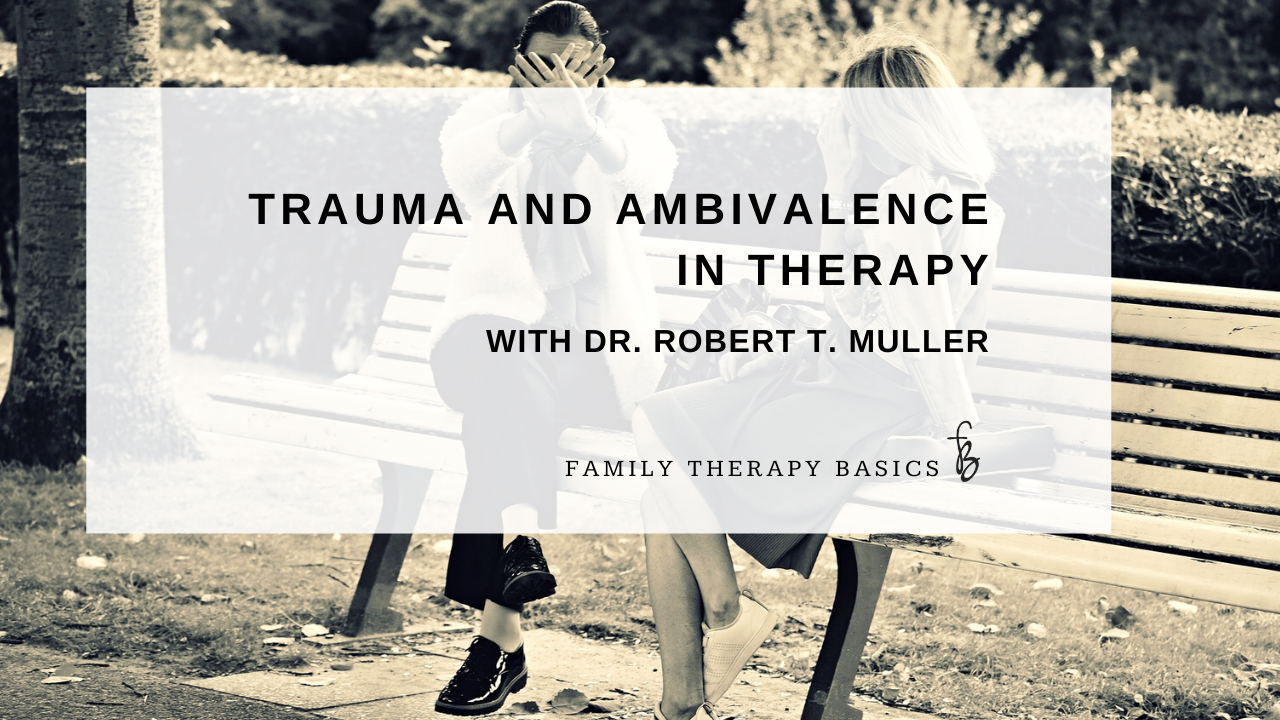In the following video, my guest is Dr. Robert T. Muller, author of Trauma and The Struggle to Open Up. Dr. Muller and I discuss the topic of clients’ ambivalence toward their trauma histories, how this ambivalence is challenged, naturally, through clients’ life experiences, as well as how the ambivalence may show up in the therapeutic encounter.
To view my discussion with Dr. Muller, click below. The transcript is also available immediately below the video. (The video length is 5 minutes, 51 seconds).
Hi everyone. This is Ili, and today I'm excited to have Dr. Robert T Muller [with me]. He is the author of Trauma and The Struggle To Open Up: From Avoidance to Recovery and Growth.
Introduction
IW: Dr. Muller, it's a pleasure to have you.
RM: Nice to be here thanks so much.
IW: Sure. And today, we're going to be discussing your work as well as your book. Could you share a bit about what you currently do for work and how it connects with trauma?
RM: Yeah, yeah. Absolutely. So, I'm a clinical psychologist a professor at York University in Toronto, and I have a trauma practice and have been working in the area of trauma--writing, teaching, doing research on various trauma therapy treatment programs, and then doing psychotherapy as well with clients, actively--over many years. Twenty-something years. Twenty-five years, maybe. Something like that.
Inspiration for the book, Trauma and The Struggle To Open Up
So my work in the area of trauma, what prompted me to write the book was seeing how people… You know one thing that I hear so much is that people have a sense that they know that they've got this difficult story, this secret, this painful past and very often people don't know even where to start.
So, all they've done is just held it inside for many, many years. Sometimes they've talked with one person or another, here and there. Maybe, you know, a girlfriend, one-time boyfriend. But, you know, not really find a way to know what to do with this painful past. And so, finding a way to help people slowly, gradually open up has been central to the work in trauma therapy.
And so, that's why I wrote the book, Trauma and The Struggle To Open Up, because I see how it is a struggle for people.
IW: Yeah; it's great title. So in that struggle, you know, the struggle to open up--and even know what to do--you say that there’s ambivalence. Then you say that poeple have ambivalence about their past and about their trauma stories. What is at the heart of that ambivalence for most of the clients that you see?
Trauma and Ambivalence
RM: Yeah. Okay, so what we see so often with trauma survivors is that many of them will avoid dealing with their painful past, and they avoid it because avoidance works. It actually is a successful, temporarily, temporarily, coping strategy. So, when you drink or when you use sexual, whatever… You know, you use sex as a way of not having to feel the pain, or you engage in substance abuse, or a number of different avoidance strategies, what you're doing is you're coping, you're avoiding the pain and managing on a day-to-day level.
The problem is, of course, that avoidance only lasts so long. It just doesn't--it's going to fall apart at some points. And, it falls apart when people, you know, have to meet different developmental milestones, or when they experience losses--you know, a parent dies, or their child is incredibly sick, or the prospect of commitment in a relationship happens, or they're about to have the birth of their first child. Or something like that--different kind of developmental changes happen.
Then people have a great deal of difficulty, and then avoidance strategies is no longer work. And so, this is often when the trauma from the past comes back. There's kind of a return of the past, and they don't know--people don't know what to do with it. What's worked up until now is no longer working. And when that happens, then it's very overwhelming.
And when people realize… And then, sometimes people, you know. I have clients who like, you know, they say things to me like:
“My boyfriend says to me that I really got a lot of stuff from my past I got to deal with,” because it's, you know, it's kind of seeped out in conversations between the two of them.
“Well, my girlfriend tells me I need therapy.”
And then I ask them, “What do you think?” And well, you know, they tell me:
“Well, I had this thing that happened when I was a kid. I don't know if it's a big deal.”
I say to them, “Well, I don't know either. Let’s explore.”
And then it becomes--it's a challenge for people, because they don't know where to start. And it's scary, and it's understandably scary. They've kind of kept it under wraps for so long, and know opening up feels like, “Well, I don’t even know how to do that.” So, that's a big process early on in the work.
So, on the one hand people have this avoidance, because it works. On the other hand, there's a part of them unconsciously that's yearning to be able to share this burden. And that's the ambivalence.
You know, on one hand it works to sort of sweep everything under the rug. On the other hand, there's a part of me that knows deep down that there's a real pain from my past, and it's a burden, and I've been carrying it around, and it's heavy, and I need to somehow unload this burden, but I don't know how. And so, there's where there's this ambivalence--kind of mixed feelings about their own past.
So, that's where the ambivalence fits in.
Dr. Robert T. Muller, is the author of Trauma and The Struggle to Open Up, and Trauma and the Avoidant Client. Dr. Muller is a professor of clinical psychology at York University, in Toronto. To learn more about Dr. Muller and his work, visit Psychotherapy Toronto.
We participate in Amazon’s affiliate program, and this post contains affiliate links. If you choose to Dr. Muller’s book(s) via our link, we earn a small commission to support our work.



